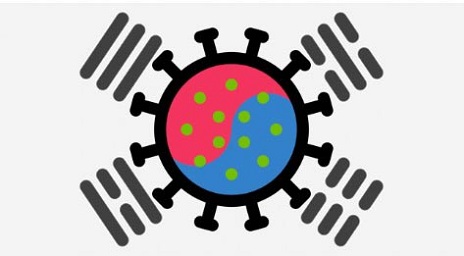COVID-19 hospitalization rates increase by 3.5 times in South Korea Amidst KP.3 variant surge
Nikhil Prasad Fact checked by:Thailand Medical News Team Jul 29, 2024 8 months, 4 weeks, 14 hours, 41 minutes ago
COVID-19 News: South Korea has witnessed a dramatic increase in COVID-19 hospitalizations, with rates tripling over the past month. According to the Korea Disease Control and Prevention Agency (KDCA), the number of hospitalized patients surged approximately 3.5 times from the fourth week of June to the third week of July.
https://www.phwr.org/main.html
https://www.phwr.org/journal/archives_Supple_View.html?eid=U3VwcGxlX251bT04Nw==
 COVID-19 hospitalization rates increase by 3.5 times in South Korea Amidst KP.3 variant surge
Summer Precautions Highlighted
COVID-19 hospitalization rates increase by 3.5 times in South Korea Amidst KP.3 variant surge
Summer Precautions Highlighted
In light of the surge, the KDCA has reiterated the importance of adhering to preventive measures to curb respiratory infections during the summer. Essential practices such as regular handwashing, proper coughing etiquette, and adequate ventilation of indoor spaces are emphasized to mitigate the spread of infections.
Tracking Hospitalization Trends
Since the reclassification of COVID-19 as a Category 4 monitored infectious disease in August last year, the KDCA has been closely monitoring patient data from 220 hospitals nationwide. After a peak in hospitalizations in early February, there was a decline until late June. However, a troubling upward trend has been observed since then, with weekly hospitalizations jumping from 63 in late June to 225 by mid-July. Local
COVID-19 News coverages also indicate that outpatient visits for respiratory infections have also gone up tremendously and in some cases putting pressure on hospitals in certain geolocations.
Vulnerable Age Groups
The data reveals that older adults are the most affected demographic, with individuals aged 65 and older accounting for nearly 65% of hospitalizations. This is followed by the 50-64 age group at 18.5% and the 19-49 age group at 10.2%. The surge in hospitalizations has been paralleled by an increase in the COVID-19 detection rate, which rose from 6.4% in June to 17% in mid-July.
Rising Variants
The spread of different COVID-19 variants has also played a significant role in the increased hospitalizations. The prevalence of the Omicron subvariant JN.1 has decreased, while the KP.3 variant has surged to 39.8%. This variant is spreading rapidly worldwide, although the World Health Organization (WHO) continues to classify it under Omicron. Despite a slight increase in immune evasion, there are no indications that KP.3 has higher transmissibility or severity.
Government Response
KDCA Commissioner Dr Jee Young-mee reassured the public that the government is closely monitoring the situation and analyzing trends in patient occurrences. The KDCA is committed to promoting respiratory infection prevention measures,
especially in vulnerable facilities like nursing homes. In the event of outbreaks, swift epidemiological investigations will be conducted to ensure a comprehensive response to COVID-19.
Future Vaccination Plans
The KDCA has announced plans to introduce new vaccines that can effectively respond to emerging variants. The 2024-2025 COVID-19 vaccination campaign is set to begin in October, aiming to bolster immunity against potential future surges.
Concurrent Outbreaks: Pertussis and Mycoplasma Pneumonia
-Pertussis Surge
Alongside the rise in COVID-19 cases, South Korea is also grappling with an outbreak of pertussis, commonly known as whooping cough. This infection has been spreading primarily among children and adolescents over the past month. As of July 20, over 13,500 cases have been reported, with the vast majority occurring in individuals aged seven to 19.
-Mycoplasma Pneumonia Alert
Mycoplasma pneumonia infections have also seen a sudden increase, prompting the government to raise the alert level in late June. Over the past four weeks, the number of hospitalized patients fluctuated but remained concerningly high, with significant numbers of cases reported each week.
Children aged seven to 12 constitute the majority of hospitalized cases for mycoplasma pneumonia, making up 51.6% of all cases. Younger children aged one to six and adolescents aged 13 to 18 are also significantly affected, comprising 27% and 10.3% of cases, respectively.
Health Advisory for Summer
As summer activities intensify and indoor ventilation decreases due to air conditioner use, the risk of respiratory infections naturally rises. The KDCA urges the public to maintain good hygiene practices, such as regular handwashing and proper coughing etiquette, to protect against infections.
Vaccination and Prevention
Timely pertussis vaccinations are strongly recommended, particularly for children and adolescents. The KDCA also stresses the importance of following preventive measures to ensure a healthy and safe summer season.
Looking Ahead
As South Korea navigates the challenges posed by the COVID-19 pandemic and concurrent outbreaks of other respiratory infections, the emphasis remains on preventive measures and vaccination. The KDCA's proactive approach and continuous monitoring aim to safeguard public health and manage the evolving situation effectively.
For the latest
COVID-19 News, keep on logging to Thailand Medical News.
Read Also:
https://www.thailandmedical.news/news/kp-3-variant-causing-rising-covid-19-cases-and-deaths-in-the-united-kingdom
https://www.thailandmedical.news/news/covid-19-cases-increased-in-texas-by-nearly-32-percent-july-7-13-compared-to-the-previous-week-s-levels
